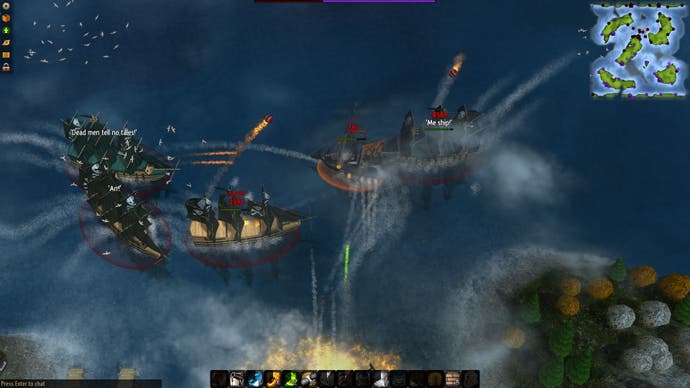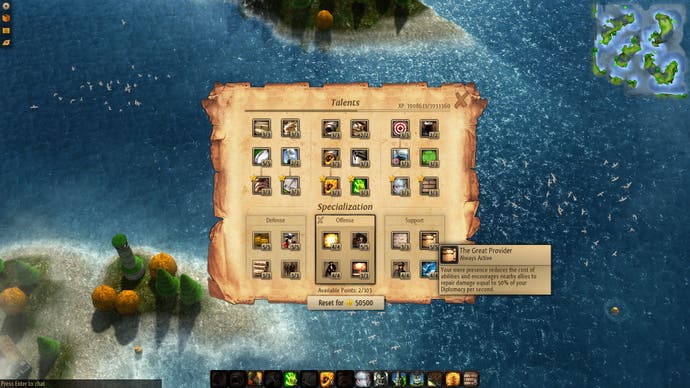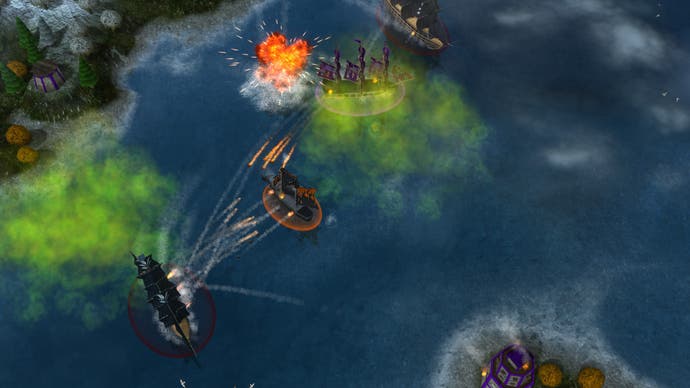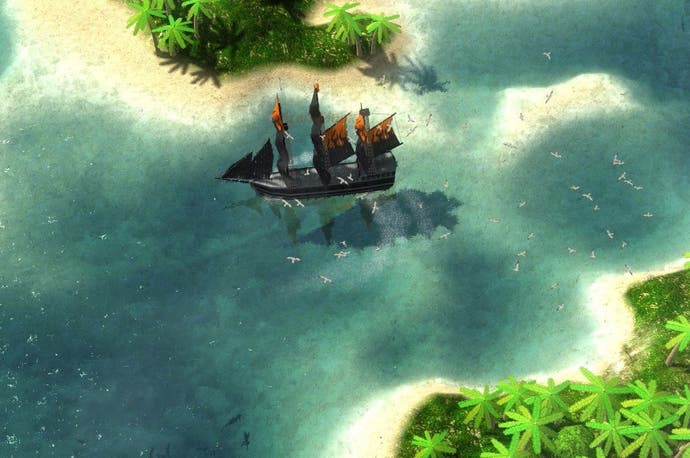Windward review
Mr Lubber Man.
All games are ultimately in the business of a selling a fantasy. The best ones conjure up a combination of presentation and mechanics that lets you imagine, for a few fleeting hours, what it would be like to live a different life: a criminal, a superhero, a racing driver, a soldier. OK, most of the time it's a soldier.
There's no shortage of games that let you march in the boots of ground troops. Sailor, on the other hand, tends not to rank too high on that list, though there have been notable attempts to recreate a life on the ocean wave in gaming. Assassin's Creed: Black Flag was the closest that mainstream blockbusters have come, but for most vintage players it's Sid Meier's Pirates! that remains the standard bearer for nautical action.
That's also the game that is most clearly the inspiration behind Windward, a maritime RPG that promises the chance to explore, trade, barter and battle your way through a procedurally generated world. It's a promise that the game sadly can't quite keep.
To start with, you must choose one of four factions. One specialises in combat, another in trading. One is all about exploration, the last is dedicated to diplomacy. The game map has a spider-like appearance, the world broken up into square chunks with a large area in the middle and tendrils leading off it. You start at the end of one such tendril, in a region controlled by your faction. Sail off the map and into the next zone, and you'll find your faction's influence begins to wane, until it's just you and a sea filled with rivals and enemies. By the time you reach the centre of the map, it's sink or swim. Literally.

To get to that point you'll need to level up your skills, and arm yourself with the best cannons, crew and ship. To start with, however, you get a tiny sloop and not much else.
Navigating Windward's delightfully rendered top-down oceans is a doddle. Using cursors, WASD or your mouse, you steer your ship by setting a speed and then simply steering left or right. A single button will drop the anchor for an immediate stop. Icons across the bottom allow for more specialised interactions, such as sending a diver down to investigate a wreck, or launching a cannon volley should enemies attack. You'll also find crates or barrels floating in the sea, and can collect those for extra cash, resources like wood (for repairing damage) or occasional rare items.
At first, pootling about is pretty good fun. The game looks lovely, and the lighting in particular is superb. The sunlight really feels like sunlight, and as you carve through the surf, sails billowing in the direction of the virtual wind, little seagulls swirling overhead and shoals of fish darting about in the clear blue water, the effect is beguiling.
Sail up to a port and you can begin making the choices that will define your nautical career. There are quests to undertake, or you can see what goods they have for sale. Local rumours will tip you off as to what items will sell best in other towns, or you can use the store to improve your ship. In one of Windward's best ideas, the towns level up alongside you. The more quests and trades you undertake at a town the more prosperous it becomes, offering better items and more lucrative opportunities.
The trouble with Windward is that it doesn't seem to know what to do with itself once these basic gameplay building blocks are in place. You sail from one town to another, ferrying passengers or delivering cargo, or else you hunt down pirates in return for a bounty. And you keep doing that. The in-game economy isn't varied or deep enough to make trading particularly interesting, and the handful of quests begin to repeat almost immediately.

The first time I picked up a mysterious sealed letter from the sea, I was thrilled. The letter led me to a town, where I was told to go to another town. Then another. And another. Eventually I was directed to a wreck, which netted me a tiny amount of loot that I could have collected three times over in the time it had taken me to follow the treasure trail. Not long after, I found another mysterious sealed letter. It led me to a town, which led me to another...
It's not even as if you have much room to multitask. Your initial ship has only two cargo slots (but 25 inventory spaces - go figure) and literally everything you do takes up one cargo slot. That makes sense when you're actually buying and trading cargo - even if scraping cash together two trades at a time feels restrictive - but it's absolutely bizarre where quests are concerned. That letter I mentioned? It takes up a cargo slot. Accept an order to take down a pirate? The order takes up a cargo slot. It's not just weird, it's stupid, as it leaves the game feeling small and fussy when it should be as vast, open and inspiring as the sea itself.
You can, of course, trade up for a bigger ship. I eventually saved up enough gold to buy a schooner. This larger, faster, stronger vessel cost almost 9000 gold coins, a sum that takes a good few hours to amass. That gets you one whole extra cargo slot, so you can have three letters open at the same time.
This is Windward's greatest weakness - the grind sets in early and it sets in hard. Yet there's clearly something to it, as I found myself being drawn in for hours at a time. Partly it's the fact that no quest, no delivery, takes more than a few minutes to complete thanks to the way the world map is broken down into more manageable discrete areas. XP is also generously dished out, and the gaps between levels are relatively small, so there's always something new to unlock in the near future.
Combat could have been a saving grace, but it's too clumsy to convince. You can only cause damage by firing a broadside, of course, so the art is to manoeuvre your ship so that you can unload on an enemy's bow or stern without exposing yourself to return fire. Your gunners will start firing automatically when they have a shot, and you can manually let loose with more damaging volleys, chain shots to tangle rigging and special attacks that unleash fire, smoke or poison gas. You can also recruit up to two other ships to sail with you, while any AI ship of the same faction will come to your aid if they pass during a battle.
What should have been a majestic and tactical game of naval combat almost always ends up as a farcical clutter of ships bouncing off each other, like toys in a bath. The AI is weak, the pathfinding muddled, so rather than feeling like Master and Commander, you feel more like you've put 50p into one of those remote controlled boats at a theme park. There are strategies you can use to minimise your damage, but the blundering nature of every other ship in the game makes their use something of a moot point.

You soon realise that the whole faction element is surplus to requirements. There's no real specialism needed, since whichever you choose you'll end up doing the same shallow quests and tackling the same battles. Exploration is a complete non-starter, since the maps have no meaningful features beyond the towns, and there's a constant GPS-style indicator directing you to every objective.
By the time you've sailed beyond your safe(ish) starting location and entered areas where you must start from scratch, the repetition and grinding become unbearable, right at the point where the game needed to hook you. Constantly spawning enemies seize control of towns over and over, forcing you to spend most of your time shuttling between them. You can dispatch your allied vessels to a location, or build guard towers, but neither seems to do much to stop this plate-spinning from dominating the long term gameplay.
Multiplayer goes some way towards addressing a few of the problems. Combat against human foes is more satisfying, though the shopping trolley controls still mean that only the broadest, bluntest tactics are worth bothering with. You're still faced with the same core issues though: the quests, the trading, the meat of the game is painfully thin.
Windward began life as a pitch for a real-time strategy game several years ago, but a failed crowdfunding campaign put an end to that iteration. It still carries traces of that DNA, but in its current form the game feels like it falls between two stools. Zoom in closer to the ship, offer more control over things like crew morale, actual navigation and a more robust trading model, and you'd have a compelling maritime simulation. Zoom out, with control over the towns and all of your faction ships, and you'd have the start of an interesting naval strategy game.
But Windward is neither of those things. After dozens of hours it still has you doing the same monotonous tasks you did at the very start, even as you claw your way to a slightly better ship in which to run your errands. For a game set on the deep blue sea, it's unforgivably shallow where it counts.

